
No. 13, 2025 | 12 September 2025
Go to:
From FRSA's Executive Director
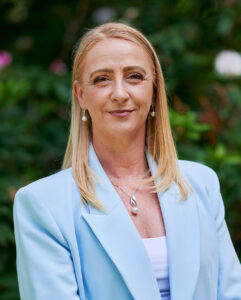
It is always very satisfying seeing projects that have been worked on for a while come in to land.
This week, I am proud to present to you FRSA’s latest research report offering, FRSA Member Mapping: Targeted intervention programs for people who use violence in intimate/family relationships.
This report shows that almost 6,000 people who use violence engage in our members’ programs each year. These moments of engagement are opportunities to protect families, support children and connect people with the services they need.
Key findings include:
- Most programs are group based, with some also providing case management or individual support
- About 80 percent include some support for partners and children, although the scope varies.
- Almost one third of programs have wait times of more than six weeks.
- Providers apply trauma informed, strengths based and culturally responsive models, yet outcomes are still often judged by attendance and completion.
FRSA is calling for recognition of these programs as a core part of the service system, for in-program supports for family members experiencing violence to be funded as standard practice, for stronger links with housing, health, justice and child and family services, and for outcomes that reflect family safety and wellbeing.
My thanks to all those in the FRSA network who participated in the project, the advisory group and of course, to Dr Robyn Clough, FRSA’s Manager of Policy and Research. She offers her own reflections on this Report below – be sure to push out Robyn’s article through LinkedIn as well.
Last week we held an Extraordinary General Meeting of Family & Relationship Services Australia for members to consider and vote on some changes to the FRSA Constitution. Whilst there were some administrative changes in the mix, the Constitutional amendments put to members were designed to address issues of board succession and to ensure appropriately qualified and experienced individuals are retained on the board by aligning member elected director terms with those of the board appointed directors. Now that the Constitution has been accepted and adopted by the members at this meeting, all FRSA Board members will be eligible to serve 3 terms of 3 years totalling 9 consecutive years of service. The Constitution and all FRSA’s corporate documents are available on the FRSA website.
The FRSA Board met today which will be the last meeting before the FRSA Annual General Meeting which will be held virtually on Wednesday, 12 November 2025. We do have one vacancy to fill on the Board with the Call for nominations going out to members on the 19th of September.
And speaking of dates…..if you are the CEO or Senior Manager leading one of our member organisations – we are looking forward to seeing you in Canberra for the Strategic Leadership Forum 29 & 30 October – registration details below.
Kind regards,
Jackie Brady
FRSA Executive Director


Don’t wait to secure your spot—register today for the FRSA Strategic Leadership Forum 2025!
We are looking forward to welcoming the CEOs and Senior Leaders in the FRSA Membership to Canberra to participate in the Strategic Leadership Forum being held 29 October and 30 October 2025. We are working hard preparing the schedule of meetings for Day 2.
We will endeavour to arrange meetings with MPs and Senators from your electorate and/or State/Territory for your Parliamentary visits on Day 2!
Access to the event details including the event program, speaker information and accommodation will be available on the FRSA Members Only Event page.
Please contact events@frsa.org.au for the password to the FRSA Member’s Only Event page.
FRSA National Conference nominated the 2025 Association Event of the Year
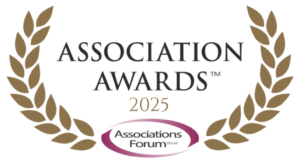 We’re excited to announce that the FRSA National Conference 2025 has been nominated for the Association Awards’ 2025 Association Event of the Year™.
We’re excited to announce that the FRSA National Conference 2025 has been nominated for the Association Awards’ 2025 Association Event of the Year™.
This prestigious award recognises outstanding conferences, expos, summits, and other events that have significantly advanced their sectors and created real value for members.
Winners will be announced at the Association Awards™ Dinner on Thursday, 6 November at Novotel & ibis Styles Melbourne Airport. Wish us luck!
FRSA Webinar 1: Supporting Aboriginal Ways of Knowing Being and Doing
If you missed the first webinar in our First Nations focus on Family and Relationship services series, Supporting Aboriginal Ways of Knowing Being and Doing: Asset- and Place-Focused Service Development and Delivery presented by Dr Jen Cleary & Jaylene Ware from Centacare Catholic Country SA, you can watch the recording now:
Register for the second FRSA First Nations webinar!
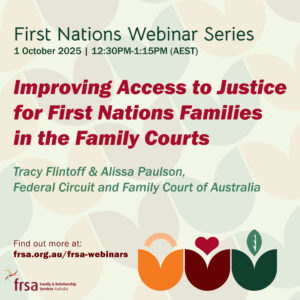 Register today for the second webinar in our First Nations focus on Family and Relationship services series, Improving Access to Justice for First Nations Families in the Family Courts presented by Tracy Flintoff and Alissa Paulson from Federal Circuit and Family Court of Australia on Wednesday, 1 October 2025.
Register today for the second webinar in our First Nations focus on Family and Relationship services series, Improving Access to Justice for First Nations Families in the Family Courts presented by Tracy Flintoff and Alissa Paulson from Federal Circuit and Family Court of Australia on Wednesday, 1 October 2025.
This webinar will explore how the Federal Circuit and Family Court of Australia is improving access to justice for Aboriginal and Torres Strait Islander families. Discover how the court’s culturally responsive model—including Indigenous Family Liaison Officers (IFLOs) and Specialist Indigenous Lists—is breaking down barriers and offering practical, supportive alternatives to traditional child protection approaches.
View the full webinar schedule below:
| Date and Time | Webinar | Presenter |
|---|---|---|
| Wednesday, 15 October 2025
12:30PM-1:15PM AEDT |
SistaCare – Collaboration for the safety of women | Sarah Todd & Dorothée Crawley, CatholicCare Wilcannia-Forbes |
| Wednesday, 5 November 2025
12:30PM-1:15PM AEDT |
Better Together | Anne-Marie Mioche, CatholicCare Wilcannia-Forbes and Alister Ferguson, Maranguka |
| Tuesday, 25 November 2025
12:30PM-1:15PM AEDT |
Growing Up Strong from early childhood: Stories and other findings from Footprints in Time: The Longitudinal Study of Indigenous Children | Stuart Ekberg and Tirritpa Ritchie, Flinders University and Kristin Laurens, Queensland University of Technology |

Gender-based undervaluation – SCHADS Award review
The Fair Work Commission is currently reviewing modern award classifications and minimum wage rates on work value grounds to remedy potential gender-based undervaluation, starting with 5 priority awards, including the Social, Community, Home Care and Disability Services Industry (SCHADS) Award 2010.
The Expert Panel for pay equity in the care and community sector undertook consultation for this Review between July 2024 and December 2024, and subsequently published provisional views on 16 April 2025. The Commission is consulting on these provisional views with hearings expected in October.
The workforce employed under the SCHADS Award is predominantly female, and the primary objective of this review is to remedy gender-based undervaluation. It is unfortunate then, that the proposed reclassification structure presented in the provisional determination looks likely to have the opposite effect for many positions under the Award. While supporting the intent of the review, many in the social and community services sector, including FRSA, have expressed serious concerns with the provisional views. For example, there are concerns that the proposed classification structure does not give sufficient weight to on-the-job training, practical experience, lived experience and cultural knowledge. Rather, there is an over-reliance on formal qualifications underpinning progression through the classification levels. As such, many anticipate that some roles will be reclassified at a lower level, attracting lower wages and that some workers’ career pathways will be limited.
We do hope that the Commission will give serious consideration to the concerns raised to avoid adverse consequences of a well-intentioned process.
FRSA’s submission is available here. Information about the gender-based undervaluation review is on the Fair Work Commission’s website.
Community legal sector launches justice action plan for the 48th Parliament
 Community Legal Centres Australia has launched its Vision for Justice at Parliament House, presenting an action plan for the 48th Parliament to address justice barriers affecting people and communities nationwide. The Vision for Justice highlights key challenges in areas such as child protection, criminal law, employment, social security, and immigration, and sets out 17 actions to guide governments and communities toward a more just system.
Community Legal Centres Australia has launched its Vision for Justice at Parliament House, presenting an action plan for the 48th Parliament to address justice barriers affecting people and communities nationwide. The Vision for Justice highlights key challenges in areas such as child protection, criminal law, employment, social security, and immigration, and sets out 17 actions to guide governments and communities toward a more just system.
Specialist homelessness services analysis
 New data from the Australian Institute of Health and Welfare has for the first time revealed the scale of children experiencing homelessness without a parent or guardian, and highlighted serious gaps in support services. The statistics show 13,300 unaccompanied children aged 12-17 sought out specialist homelessness services in 2023-24. Of those children, 2,443 were aged 12-14, 96% were alone, 6% were in a grouping of children, and 63% were female. 3 in 4 unaccompanied children (77%) who were homeless when support started were still homeless when support ended in 2023-24. Read more.
New data from the Australian Institute of Health and Welfare has for the first time revealed the scale of children experiencing homelessness without a parent or guardian, and highlighted serious gaps in support services. The statistics show 13,300 unaccompanied children aged 12-17 sought out specialist homelessness services in 2023-24. Of those children, 2,443 were aged 12-14, 96% were alone, 6% were in a grouping of children, and 63% were female. 3 in 4 unaccompanied children (77%) who were homeless when support started were still homeless when support ended in 2023-24. Read more.
New Research: It Takes a Village to Raise a Child
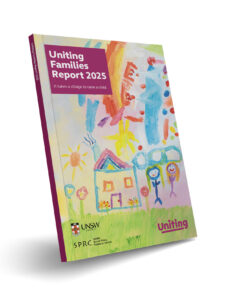 Uniting NSW.ACT, in partnership with the UNSW Social Policy Research Centre, has released the second Uniting Families Report.
Uniting NSW.ACT, in partnership with the UNSW Social Policy Research Centre, has released the second Uniting Families Report.
The research explores the networks of support surrounding families across Australia and reveals:
- Most families value their support networks, but access is unequal.
- Housing insecurity, financial stress and caring responsibilities can limit families’ ability to build and sustain these connections.
- Families’ own voices and experiences show the importance of strong, supportive “villages” for wellbeing.
The findings highlight the role for services to invest in relational and place-based approaches, helping all families to build and maintain the village of their choosing. View the full report.

Health impacts of alcohol and other drugs in Australia
The Minister for Health and Ageing, the Hon Mark Butler MP has re-referred the inquiry into the health impacts of alcohol and other drugs in Australia to the House Standing Committee on Health, Aged Care and Disability. The inquiry will review policy, treatment services, community programs and workforce settings to assess whether they support prevention, harm reduction and recovery.
The committee welcomes written submissions by 31 October 2025, with previous submissions from the last Parliament also being reconsidered, so resubmission is not required.
National Child Safety Review: Decision Regulation Impact Statement
The Department of Education have released their Decision Regulation Impact Statement (D-RIS) addresses findings from the Child Safety Review (CSR) that, while the National Quality Framework is robust, further measures are needed to strengthen protections and improve child safety in education and care services. The CSR highlighted gaps in policies, staff capabilities, and safeguards against emerging issues, including online risks. The D-RIS recommends regulatory and non-regulatory options such as child safety training, device management, enforcement measures, information sharing, supervision improvements, and working with children checks selected for their highest net benefit through multi-criteria and cost analysis.
Inquiry into the Thriving Kids initiative
On 2 September 2025, the Minister for Health and Ageing, the Hon Mark Butler MP referred an inquiry into the Thriving Kids Initiative to the House Standing Committee on Health, Aged Care and Disability. Written submissions addressing the terms of reference are invited by 3 October 2025, and a brief survey is also now available to gather community feedback on the experiences of families and carers in accessing support services for children with additional needs.
The survey will be open until Friday, 10 October 2025.
Mental health service trends in 2023–24
The Australian Institute of Health and Welfare (AIHW) has released its third update for the Mental Health Online Report. This includes emergency department data, admitted patient care, seclusion and restraint figures, quarterly service activity, regional profiles, and new insights into the burden of mental illness, including First Nations–specific data. The update also features improved navigation and data presentation for easier use. Read the full report

Wear it Purple Day
On 29 August 2025 it was Wear It Purple Day, an annual LGBTIQA+ awareness day especially for young people. This year’s theme, “Bold Voices, Bright Futures,” was a powerful reminder of the importance of creating safe, supportive, and inclusive spaces where every young person feels seen, heard, and valued.
See how FRSA Members around the country celebrated the day:
- Lifeline Darling Downs & South West QLD’s team wore purple to show their commitment to standing alongside the LGBTQIA+ community.
- Drummond Street Services’ Carlton site had an afternoon tea to celebrate 15 years of Wear it Purple. They talked about the history of the campaign, this year’s theme and how they can continue to support the young LGBTIQA+ people they work with to help them thrive.
- Staff at Barnardos Australia’s head office celebrated by wearing purple.
- Relationships Australia Victoria staff wore purple and supported the day as part of their commitment to provide safe, inclusive and accessible services and workplaces for all.
- Capital Region Community Services held a Wear It Purple Day event, a friendly, safe space to connect with the community, they included live performances from local drag performers and trivia.
- yourtown shared the importance of creating safe spaces where everyone feels welcome and one of the ways their staff do that is by displaying ‘Safe Space’ and ‘Ally’ stickers in the office and beyond.
- Mallee Family Care’s teams across Swan Hill, Mildura and Dareton celebrated the day by making their own pronoun badges.
- Anglicare WA’s Joondalup, Broome and Youth Housing teams wore their favourite shade to support and empower young people from the LGBTQIA+ community.
- MacKillop Family Services held a morning tea and staff wore purple to commemorate the day.
- Relationships Australia Canberra & Regions’ Canberra office staff wore purple for the day.
- Staff across Odyssey Victoria’s sites celebrated the day.
- The Australian Institute of Family Studies team showed their support for the day by wearing purple, a visual symbol of our shared commitment to fostering safe, inclusive spaces where rainbow young people are seen, heard, and valued.
- The Meli team originally planned to celebrated the day with a basketball game but the weather had other plans. Even though it was rained out, their commitment to standing with LGBTQIA+ youth remains strong, rain or shine.
South Australian Child Protection & Family Support Awards
Congratulations to FRSA Members who’s staff and teams won at the 2025 South Australian Child Protection & Family Support Awards. The awards celebrate the outstanding achievements of children and young people, carers, volunteers, staff and organisations from across the child protection sector.
Congratulations to winners:
- Relationships Australia SA’s Ngartuitya Family Group Conferencing who won the Active Efforts Awards
- Centacare Catholic Community Services’s Foster Care program – Reunification Model who won the Outstanding Service Award – Sector Development
And congratulations to those that were nominated:
- Lutheran Care Foster/Kinship carers, Tara and Scott Forbes-Godfrey for the Active Efforts Award
Family Care welcomes new CEO
 FamilyCare’s new Chief Executive Officer, Andie West commenced with the organisation on Monday 8 September 2025.
FamilyCare’s new Chief Executive Officer, Andie West commenced with the organisation on Monday 8 September 2025.
She said, “I am thrilled to be joining such a respected, purpose-driven organisation and to continue my commitment to people, purpose, and partnerships in a role that has such meaningful impact for children, families and across communities.”
Andie was previously the Manager Community Partnerships at City of Greater Bendigo. She succeeds former FamilyCare CEO David Tennant who was with the organisation from May 2010 and finished up in July this year.
FRSA wishes David all the best for the future and congratulations to Andie on the new role.
Vale Dr Neil Harrigan
 FRSA was deeply saddened to hear of the passing of Dr Neil Harrigan, former CEO of Marymead CatholicCare Canberra & Goulburn (formerly CatholicCare/Centacare Canberra Goulburn).
FRSA was deeply saddened to hear of the passing of Dr Neil Harrigan, former CEO of Marymead CatholicCare Canberra & Goulburn (formerly CatholicCare/Centacare Canberra Goulburn).
Dr Harrigan made a profound and lasting impact on the organisation and the broader community. He became the first lay leader of Centacare in February 1994, bringing with him a deep commitment to social justice and a passion for serving those most in need.
His involvement with Centacare began even earlier, during his time with the Commonwealth Public Service in central Queensland, drawing on his qualifications as a psychologist, he volunteered as a sessional counsellor at the Rockhampton office.
Under his leadership, Centacare evolved beyond its traditional service areas to provide critical support in homelessness, drug & alcohol addiction, acquired brain injury, refugee resettlement, mental health, suicide intervention, housing, disability care, aged care and employment – the focus was always on supporting people experiencing disadvantage.
He guided the organisation through a period of significant sector reform and political change in Australia, with deinstitutionalisation, the outsourcing of government services and the introduction of competitive tendering.
In 2014, Neil stepped down as CEO but remained dedicated to supporting vulnerable members of the community, continuing to provide psychological counselling. His lifelong service was recognised in 2021 with a Papal Honour, receiving the Order of Saint Gregory from Pope Francis.
We extend our heartfelt condolences to Neil’s family, friends and colleagues.

Beyond program completion: valuing family outcomes in intervention programs
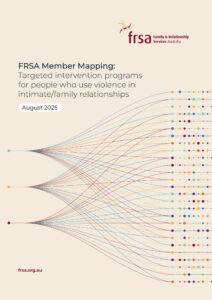
By Dr Robyn Clough, Manager, Policy & Research, FRSA
When policymakers talk about programs for people who use violence in their relationships, the question is often the same: did they complete it? On paper, completion seems like a tidy measure. But for families living with violence, it misses what matters most.
The FRSA Member Mapping report points to the true impact of the programs run by our Members. Each year, almost 6,000 people who use violence engage with programs delivered by Members. These are not just individuals. They are parents, partners and family members. Every time they engage, there is an opportunity to support the people around them.
Our report found that most programs are group-based, but some also provide case management and individual support. This flexibility matters because group work does not suit everyone. People facing housing stress, mental health challenges or substance use may need more tailored approaches. Providers know this, and they adapt where they can.
Importantly, about 80 percent of programs offer some support for partners, ex-partners or children. That support can be the difference between a family struggling in silence and a family being connected to counselling, housing or safety planning. Yet too often, this work is not consistent, measured or resourced. Outcomes are still largely judged on whether a person using violence completes the program (or even just starts it), not whether their family is safer.
If policy is serious about ending family violence, this has to change. Funding must recognise the value of all engagement, not just completion. Program supports for families need to be built in as standard, not added on as extras. Programs must be deliberately linked with housing, health, justice and child and family services. And evaluation must capture impacts on families, not just on the person using violence.
FRSA members are already delivering this work every day. They have the trust of their communities and the skills to work across whole-of-family needs. With the right policy and funding settings, intervention programs can become a powerful lever for reducing violence and building safer families. It is time to expand our view of success to include what families need most: safety, stability and support.

Anti Poverty Week 2025
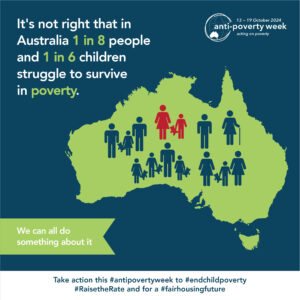 Anti-Poverty Week is coming up from 12 to 18 October.
Anti-Poverty Week is coming up from 12 to 18 October.
More than 1 in 6 Australian children are growing up in poverty. Growing up in poverty is simply bad for children, it diminishes their physical and mental health, reduces their readiness for school and attainment in school, and the effects can last well into adulthood. Let’s make sure that all Australian children and families can cover the basics and have a secure roof over their heads. All children can thrive and be healthy when they have what they need to develop well.
Submit your Anti-Poverty Week events and activities now and email apw@antipovertyweek.org.au once submitted to get up on the Anti-Poverty Week calendar. There are also a range of resources available to download from the APW website.
Establishment of an Accreditation Scheme for Children’s Contact Services
The Attorney-General’s Department is consulting on options to establish an accreditation scheme for CCS. Feedback from the consultation process will help the department to complete an impact analysis of the various options, which is a requirement under the Australian Government’s Impact Analysis process (overseen by the Office of Impact Assessment in the Department of Prime Minister and Cabinet).
Submissions are due by COB Monday, 15 September 2025. Respondents to the consultation can address as many or as few of the questions posed in the department’s consultation paper as they like.
Call for abstracts for the Australian Elder Abuse Conference 2026
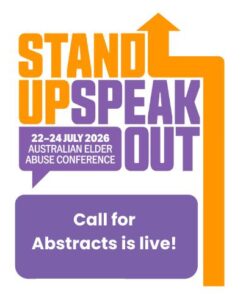 Call for abstracts are now open for the Australian Elder Abuse Conference 2026 Stand Up, Speak Out on the Gold Coast from 27-29 July 2026.
Call for abstracts are now open for the Australian Elder Abuse Conference 2026 Stand Up, Speak Out on the Gold Coast from 27-29 July 2026.
Conference organisers are inviting submissions for presentations, workshops, panels, performances, and posters that address the abuse, neglect, or mistreatment of older people and connect with the conference themes of Standing Up, Rights and Equity, Prevention, and Speaking Out
Abstract submissions close on 7 October 2025.
Read the full abstract document or visit their conference website to submit your abstract.
NSW Community Consultation: Foundational Supports for Children Under 9
The NSW Government, alongside the Australian Government and other jurisdictions, is developing foundational supports for children under nine with autism or developmental delay. These supports will help children meet developmental milestones and equip families, carers and kin with the tools to support their child’s needs. Community consultations are running across NSW and online from August to November 2025. For more information and to see the dates and locations are currently planned here.
CHC81115 Graduate Diploma of Family Dispute Resolution – July 2025, Online
SOLUTION FOCUSED BRIEF THERAPY
THERAPLAY®: Level One & MIM
QLD
Family Dispute Resolution Practitioner – Rockhampton | CatholicCare Central Queensland
NSW
Program Manager – Family & Relationship Services | Interrelate
Program Manager – Family & Relationship Services | Interrelate
Counsellor | Relationships Australia NSW
Couple and Family Counsellor | Relationships Australia NSW
NT
Financial Counsellor | Anglicare NT
If you have any events you’d like listed on the FRSA Events and Training Calendar or job vacancies you’d like listed on the FRSA Jobs Board, email Communications Officer, Vanessa Lam at communications@frsa.org.au. Please note that posting onto the FRSA website is reserved for FRSA Members only.

Health inequities in Australia | Australian Human Rights Commission
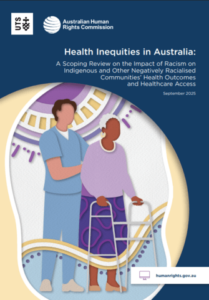 This scoping review explores the impacts of racism in Australia on health outcomes and healthcare access, particularly as they affect Aboriginal and Torres Strait Islander Peoples and other negatively racialised communities. It finds that racism – both systemic and interpersonal – is a critical driver of poor health, chronic illness and premature death. The report calls for urgent reforms.
This scoping review explores the impacts of racism in Australia on health outcomes and healthcare access, particularly as they affect Aboriginal and Torres Strait Islander Peoples and other negatively racialised communities. It finds that racism – both systemic and interpersonal – is a critical driver of poor health, chronic illness and premature death. The report calls for urgent reforms.
Emerging Minds – Five Key Practice Shifts for Working with Children | Emerging Minds
Emerging Minds identifies five key practice shifts to centre children’s voice and agency in professional work: recognising children as active participants rather than passive recipients; valuing their knowledge and strengths; engaging them as contributors to co-create understanding; looking beyond labels to understand the broader context of their lives; and prioritising bottom-up approaches that respond to children’s and families’ needs rather than imposing top-down expectations. These shifts support practitioners in promoting children’s wellbeing, autonomy, and meaningful participation in decisions affecting their lives.
Self-reported desistance and help-seeking approaches of child sexual offenders on the darknet | Australian Institute of Criminology
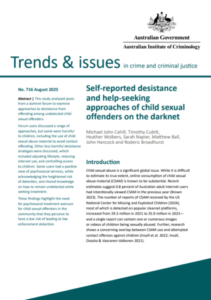 To inform prevention and intervention approaches, this study analysed posts from a darknet forum to examine approaches to desistance from offending among undetected child sexual offenders. The findings highlight the need for psychosocial treatment avenues for child sexual offenders.
To inform prevention and intervention approaches, this study analysed posts from a darknet forum to examine approaches to desistance from offending among undetected child sexual offenders. The findings highlight the need for psychosocial treatment avenues for child sexual offenders.
Understanding child sexual abuse | Early Childhood Australia
A new factsheet by Early Childhood Australia helps practitioners to strengthen day-to-day safeguarding practices and build their confidence in responding to children’s needs. It provides information on different forms of child sexual abuse, physical and behavioural signs that might indicate a child is being or has been sexually abused and how to respond appropriately to signs or disclosures of child sexual abuse.
Australian youth online: findings from the Longitudinal Study of Australian Children (LSAC) | Department of Infrastructure, Transport, Regional Development, Communications, Sport and the Arts
This report analyses the Longitudinal Study of Australian Children to understand the experiences of technology use for young Australians. The research considers children and young people’s access to digital technologies by different socio-economic groups and their online safety experiences. It finds that while Australian children are increasingly online, digital connectivity differs by socioeconomic background.
Trauma-informed practice in family mental health support services | Australian Institute of Family Studies
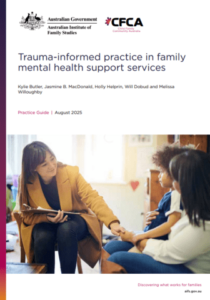 This practice guide summarises research and practice evidence about strategies for trauma-informed practice. It covers what trauma-informed practice is; organisation-level responsibilities for implementing trauma-informed practice and barriers; and trauma-informed practice strategies practitioners can implement.
This practice guide summarises research and practice evidence about strategies for trauma-informed practice. It covers what trauma-informed practice is; organisation-level responsibilities for implementing trauma-informed practice and barriers; and trauma-informed practice strategies practitioners can implement.
Progress report 2022–24 | Workplace Gender Equality Agency
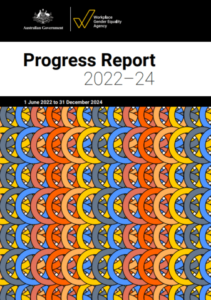 Australia is at the start of a renewed push to improve workplace gender equality sparked by extensive legislative reforms. This report shows in part what employers were doing in anticipation of those reforms, and the opportunities for progress that lie ahead. It details the progress achieved in relation to gender equality indicators from 2022 to 2024.
Australia is at the start of a renewed push to improve workplace gender equality sparked by extensive legislative reforms. This report shows in part what employers were doing in anticipation of those reforms, and the opportunities for progress that lie ahead. It details the progress achieved in relation to gender equality indicators from 2022 to 2024.
Policy brief: developing a primary prevention workforce | OurWatch
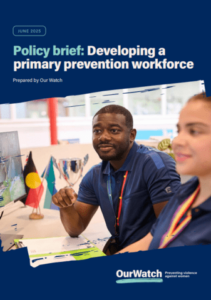 This policy brief provides policymakers with guidance on how to build, strengthen and support the primary prevention workforce – whose roles contribute to the primary prevention of violence against women – in Australia. It outlines the short and long-term benefits of investing in this workforce and identifies opportunities for Commonwealth, state and territory governments.
This policy brief provides policymakers with guidance on how to build, strengthen and support the primary prevention workforce – whose roles contribute to the primary prevention of violence against women – in Australia. It outlines the short and long-term benefits of investing in this workforce and identifies opportunities for Commonwealth, state and territory governments.
Insights on refugees with disability in Australia Foundations for Belonging 2025 | Early Childhood Australia
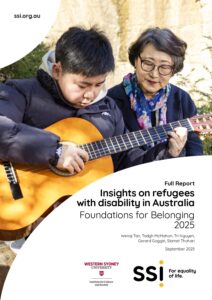 Foundations for Belonging 2025 is in their fifth phase of reports on the experiences of newly arrived refugees with disability in Australia. While refugee rights are long established under the Refugee Convention, disability rights are protected under the UN Convention on the Rights of Persons with Disability, ratified by Australia in 2008. Increasing numbers of refugees with disability are settling in Australia, facing intersecting challenges that can both support and hinder their settlement and integration. This phase of research used 75 surveys and 13 interviews with refugees and their carers, mostly from Iraq, Syria, and Afghanistan, who had lived in Australia for around four years.
Foundations for Belonging 2025 is in their fifth phase of reports on the experiences of newly arrived refugees with disability in Australia. While refugee rights are long established under the Refugee Convention, disability rights are protected under the UN Convention on the Rights of Persons with Disability, ratified by Australia in 2008. Increasing numbers of refugees with disability are settling in Australia, facing intersecting challenges that can both support and hinder their settlement and integration. This phase of research used 75 surveys and 13 interviews with refugees and their carers, mostly from Iraq, Syria, and Afghanistan, who had lived in Australia for around four years.
Competitive care: why, when and how competition can improve human services | Productivity Commission
 The care economy, including health, aged care, child and disability services, is central to Australia’s human services sector but often poorly defined and designed. Weak market structures, poor incentives, and lack of planning have led to low productivity, with the non-market sector recording negative labour productivity over the past decade, dragging down Australia’s overall growth.
The care economy, including health, aged care, child and disability services, is central to Australia’s human services sector but often poorly defined and designed. Weak market structures, poor incentives, and lack of planning have led to low productivity, with the non-market sector recording negative labour productivity over the past decade, dragging down Australia’s overall growth.
Research Highlights Mental Health Risks for New fathers | Australian Institute of Family Studies
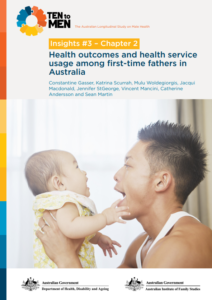 New AIFS research shows first-time fathers with a history of depression are eight times more likely to experience it again, while overall they are less likely to develop moderate or severe depression than non-fathers. Younger dads, those in disadvantaged areas, and city-based fathers are at higher risk, with many facing barriers to healthcare. The findings highlight the need for early support and better integration of fathers into health systems to strengthen family wellbeing.
New AIFS research shows first-time fathers with a history of depression are eight times more likely to experience it again, while overall they are less likely to develop moderate or severe depression than non-fathers. Younger dads, those in disadvantaged areas, and city-based fathers are at higher risk, with many facing barriers to healthcare. The findings highlight the need for early support and better integration of fathers into health systems to strengthen family wellbeing.
Being Valued Toolkit | Your Community Health and Transgender Victoria
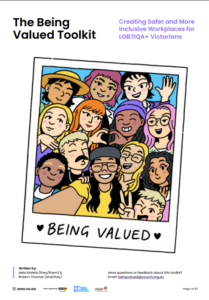 Your Community Health and Transgender Victoria, supported by WorkSafe Victoria, have developed the Being Valued Toolkit — a practical resource to help workplaces reduce gendered violence and create safer, more inclusive environments for LGBTIQA+ employees. The toolkit provides policy guidance, risk management tools, lived-experience case studies, and referral pathways. It’s designed for leaders, HR professionals and staff across all sectors who are working to build respectful, inclusive workplace cultures.
Your Community Health and Transgender Victoria, supported by WorkSafe Victoria, have developed the Being Valued Toolkit — a practical resource to help workplaces reduce gendered violence and create safer, more inclusive environments for LGBTIQA+ employees. The toolkit provides policy guidance, risk management tools, lived-experience case studies, and referral pathways. It’s designed for leaders, HR professionals and staff across all sectors who are working to build respectful, inclusive workplace cultures.
Young men’s media landscaping report | Movember Foundation
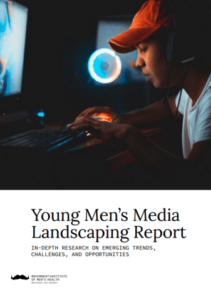 This report examines the digital ecosystems of 3,783 young men aged 12–17 across six countries, mapping their online habits, needs, and emerging trends. such as podcast use and AI in dating and relationships. Its aims are to provide a detailed understanding of young men’s online lives and to offer evidence-based insights for researchers, policymakers, and practitioners addressing health and wellbeing issues.
This report examines the digital ecosystems of 3,783 young men aged 12–17 across six countries, mapping their online habits, needs, and emerging trends. such as podcast use and AI in dating and relationships. Its aims are to provide a detailed understanding of young men’s online lives and to offer evidence-based insights for researchers, policymakers, and practitioners addressing health and wellbeing issues.
Want to submit something to the FRSA eBulletin?
If you have an news item or event that you would like to be featured in a future eBulletin please submit your announcement via the form below or email communications@frsa.org.au with the subject “FRSA eBulletin submission”.
Please note FRSA members receive priority for items posted in the eBulletin. And to keep information current, relevant and useful, submissions will not be repeated from week to week.
Subscribe
Subscribe to receive future eBulletin editions directly to your inbox!







